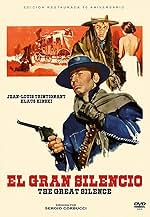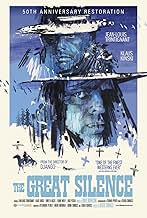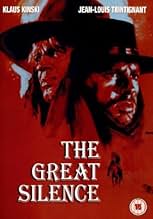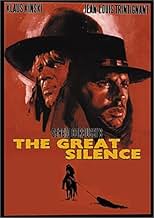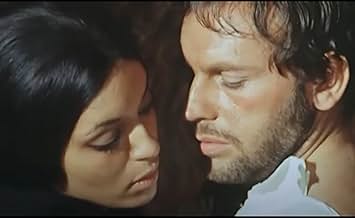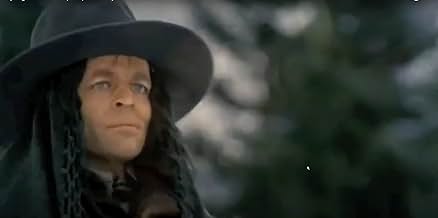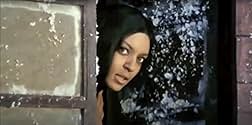VALUTAZIONE IMDb
7,7/10
19.513
LA TUA VALUTAZIONE
Un pistolero muto difende una giovane vedova e un gruppo di fuorilegge contro una banda di cacciatori di taglie nell'inverno del 1898 e si svolge una lotta tesa.Un pistolero muto difende una giovane vedova e un gruppo di fuorilegge contro una banda di cacciatori di taglie nell'inverno del 1898 e si svolge una lotta tesa.Un pistolero muto difende una giovane vedova e un gruppo di fuorilegge contro una banda di cacciatori di taglie nell'inverno del 1898 e si svolge una lotta tesa.
- Regia
- Sceneggiatura
- Star
- Premi
- 1 vittoria in totale
Jean-Louis Trintignant
- Silenzio
- (as Jean Louis Trintignant)
Vonetta McGee
- Pauline Middleton
- (as Vonetta Mc Gee)
Carlo D'Angelo
- Governor of Utah
- (as Carlo D' Angelo)
Fortunato Arena
- Outlaw
- (non citato nei titoli originali)
Giulio Baraghini
- Man in Saloon
- (non citato nei titoli originali)
Gino Barbacane
- Poker Player
- (non citato nei titoli originali)
Lino Coletta
- Hunter
- (non citato nei titoli originali)
Recensioni in evidenza
Without a doubt, one of the most overlooked films of all time. Watching THE GREAT SILENCE today, many of today's viewers may find some "cliche'd" scenes, along with some distracting dubbing. But this flick packs much more than one can bargain for.
-Plot: Bounty Hunters are collecting paychecks by snabbing up bandits in late 1880's Utah. A master gunfighter, "Silence", is out to collect dollars by killing those same bounty hunters who prey on the helpless marauders. "But who are the REAL bad guys?" is a question that carries throughout the entire film. As I mentioned before, there may be some moments in this film that seem dated and familiar, but let's focus on the un-familiar.."Silence" is mute, his throat slashed by bounty killers. Not only that, but he ALWAYS draws his gun in self-defense..Never draws first. And instead of arming himself with the traditional .38, "Silence" packs a Mauser C-96 (aka "Broomhandle") drawing fear into those who stand in his way. What else? Well, since Capt. Kirk brought forth headlines by kissing Lt. Uhura on STAR TREK, director Sergio Corbucci goes all out for a full interracial love scene (Unthinkable at the time) . What else?? This bad-boy takes place in the cold, desolated snow-bound hills, where a lot of violent stuff just seems to always happen..In fact, the blood-red violence appears much more graphic than ever in the white-frozen snow. And of course, there's the much-talked-about ending that is bound to slap EVERYONE in the face.
Here, Klaus Kinski proves that he was one of the most intense actors ever to appear in the 20th century. Just watch his movements/expressions during the last climactic scenes. Oh yeah, Ennio Morricone's incredible music is presented through-out. Want more? Please watch this film...If you can get a hold of it!
-Plot: Bounty Hunters are collecting paychecks by snabbing up bandits in late 1880's Utah. A master gunfighter, "Silence", is out to collect dollars by killing those same bounty hunters who prey on the helpless marauders. "But who are the REAL bad guys?" is a question that carries throughout the entire film. As I mentioned before, there may be some moments in this film that seem dated and familiar, but let's focus on the un-familiar.."Silence" is mute, his throat slashed by bounty killers. Not only that, but he ALWAYS draws his gun in self-defense..Never draws first. And instead of arming himself with the traditional .38, "Silence" packs a Mauser C-96 (aka "Broomhandle") drawing fear into those who stand in his way. What else? Well, since Capt. Kirk brought forth headlines by kissing Lt. Uhura on STAR TREK, director Sergio Corbucci goes all out for a full interracial love scene (Unthinkable at the time) . What else?? This bad-boy takes place in the cold, desolated snow-bound hills, where a lot of violent stuff just seems to always happen..In fact, the blood-red violence appears much more graphic than ever in the white-frozen snow. And of course, there's the much-talked-about ending that is bound to slap EVERYONE in the face.
Here, Klaus Kinski proves that he was one of the most intense actors ever to appear in the 20th century. Just watch his movements/expressions during the last climactic scenes. Oh yeah, Ennio Morricone's incredible music is presented through-out. Want more? Please watch this film...If you can get a hold of it!
Sergio Corbucci had me a little fooled at first; from seeing Navajo Joe, the first I'd seen of his films, I thought he was more of a spinster in the comical sense than Sergio Leone was. Although Corbucci doesn't nearly have the level of directorial talent as him (then again who does), there's a level of enthrallment in making a movie, in pushing an in-your-face style that works to his advantage. The Great Silence is pretty far from Navajo Joe, mostly because any laugh to be had is unintentional, or at the expense of star Klaus Kinski if one is already a fan (hearing him dubbed after seeing so many of his Herzog roles is a little staggering). The story boils down to vendettas and paybacks and paydays between scorned bounty hunters and duped sheriffs, plus the title character- named as such because of a mute demeanor and because actor Trintignant didn't want to learn any lines- leading Silence and Loco (albeit this isn't even one of Kinski's craziest performances by far) into a final showdown.
The circumstances leading up to this showdown should, in a more conventional western, be pretty clean-cut. But what's impressive, if almost a little circumstantial, is that Corbucci puts in little unconventional markers along the way: the high-drama scene where Silence gets his hand burnt by a goon as foreshadowing for the ominous bounty hunter massacre, and for those little moments when life seems so easily killed off, particularly at the start. Silence, like in a Leone film, does have something of a gimmick as a killer, as he shoots off the thumbs of his targets. But Corbucci's drama isn't keened on incredible suspense sequences in operatic form or gallows humor. Even a sex scene for Corbucci has a tenderness to it that feels the work of someone trying to break out of squarely B-movie extremities and trying for something more. If it isn't altogether successful it's attributable to flaws scattered around: random 'soft-lighting' in the last act that is very distracting, a couple of plot points not totally clear even by the end, and Kinski looking sometimes like a pretty boy as much as a sadistic bounty hunter, plus Corbucci's tendencies to favor close-ups for more formulaic means as opposed to drawing out deeper emotions through a more keen system.
But even with Corbucci not being a 'great' director, he has a keen eye for Utah (if it is Utah, which it probably isn't), and the vast vistas of snow and fields in a plain sight that contrasts the sort of void sucking the characters in with the hopeless center of bounty hunters without the strongest opponent. And Morricone, as if it was like breathing, fleshes out scenes so well with his beautiful score, only slightly below the magnificence of a Leone picture. You may feel by the end that it's not the prettiest western you've ever seen, but it has that possibility in its low-budget blood-stained manner to stay with you long after it's over.
The circumstances leading up to this showdown should, in a more conventional western, be pretty clean-cut. But what's impressive, if almost a little circumstantial, is that Corbucci puts in little unconventional markers along the way: the high-drama scene where Silence gets his hand burnt by a goon as foreshadowing for the ominous bounty hunter massacre, and for those little moments when life seems so easily killed off, particularly at the start. Silence, like in a Leone film, does have something of a gimmick as a killer, as he shoots off the thumbs of his targets. But Corbucci's drama isn't keened on incredible suspense sequences in operatic form or gallows humor. Even a sex scene for Corbucci has a tenderness to it that feels the work of someone trying to break out of squarely B-movie extremities and trying for something more. If it isn't altogether successful it's attributable to flaws scattered around: random 'soft-lighting' in the last act that is very distracting, a couple of plot points not totally clear even by the end, and Kinski looking sometimes like a pretty boy as much as a sadistic bounty hunter, plus Corbucci's tendencies to favor close-ups for more formulaic means as opposed to drawing out deeper emotions through a more keen system.
But even with Corbucci not being a 'great' director, he has a keen eye for Utah (if it is Utah, which it probably isn't), and the vast vistas of snow and fields in a plain sight that contrasts the sort of void sucking the characters in with the hopeless center of bounty hunters without the strongest opponent. And Morricone, as if it was like breathing, fleshes out scenes so well with his beautiful score, only slightly below the magnificence of a Leone picture. You may feel by the end that it's not the prettiest western you've ever seen, but it has that possibility in its low-budget blood-stained manner to stay with you long after it's over.
The spaghetti western is a hybrid creature in many ways. it mixes the great American legend by demystifying it with European pessimism. It plays the landscapes and its inhabitants as ambiguous vehicles of destiny and violence (the background often conveys the mood more than the characters, as the films of Corbucci and Leone demonstrate). And although Fistfull of Dollars is mean and lean, it remains a pale copy of Kuroswa's superior Yojimbo. Despite it's beautiful opera, Once upon a Time in the West is too elegant. despite its biting humor and epic scope, the Good, the Bad and the Ugly is too playful...
What we have here, is nothing less than the ultimate essence of the Spaghetti Western: irony, cruelty, tenderness, beauty, violence, larger than life characters... and chaos. the chaos is as present in the general mood as it is in Corbucci's wild and messy camera-work (from beautiful panoramas to crash zooms and close ups that accentuate the villains' ugliness).
The story is straight and simple but allows for great characters as the mute bounty hunter Silence (Trintignant, conveying impossible emotion with nothing but his haunting eyes) travels to a snowy town to bring down the killer of his client's husband and coincidentally fulfill a more personal vengeance. He is pitted against a range of pathetic and ugly villains, headed by a sleazy and psychotic Loco (Kinski, mesmerizing as the cruel but contained and playful killer).
All the while the nihilism and harshness of nature weigh over these characters as people freeze to death, a man drowns in a frozen lake and the survival of the fittest is demanded in a bloody fashion, leading to a devastating ending that seals this tight film together as a magnificently macabre opera of death. Unmissable.
What we have here, is nothing less than the ultimate essence of the Spaghetti Western: irony, cruelty, tenderness, beauty, violence, larger than life characters... and chaos. the chaos is as present in the general mood as it is in Corbucci's wild and messy camera-work (from beautiful panoramas to crash zooms and close ups that accentuate the villains' ugliness).
The story is straight and simple but allows for great characters as the mute bounty hunter Silence (Trintignant, conveying impossible emotion with nothing but his haunting eyes) travels to a snowy town to bring down the killer of his client's husband and coincidentally fulfill a more personal vengeance. He is pitted against a range of pathetic and ugly villains, headed by a sleazy and psychotic Loco (Kinski, mesmerizing as the cruel but contained and playful killer).
All the while the nihilism and harshness of nature weigh over these characters as people freeze to death, a man drowns in a frozen lake and the survival of the fittest is demanded in a bloody fashion, leading to a devastating ending that seals this tight film together as a magnificently macabre opera of death. Unmissable.
Klaus Kinski, an actor famed for his eccentricities and Werner Herzog collaborations, which occurred throughout the '70s and '80s. He is the lingering, temperamental and key constituent for the obscure 1968 gem, The Great Silence. Arguably, the work is partially responsible (or is rather the "finishing note") to the end of the '60s, Italian sub-genre named the "spaghetti western." This is a loose term, regularly associated with the works of Sergio Leone and few erstwhile, Italian directors who approached the spin-off genre of the stereotypical, American western. The Italian westerns emerged within the mainstream, during the midway of the '60s, becoming recognised for the close resemblance they all had with each other. The ostensible sped-up zooms, jarring scores and unforgiving violence marked the genre as the most rebellious and hard-boiled of its time. The Great Silence further proves this perceived notion.
Director Sergio Corbucci (known for his hyper-violent, but somewhat communitarian motifs) incorporates both American and European cinema values, as well as the themes generally condoned along with the western genre. Telling the tale of a ruthless bounty-hunter ironically named Loco, (played by Klaus Kinski, always fitting the mould of a maniac) who wanders the snow-ridden state of Utah in search of "wanted: dead or alive" criminals. Essentially, he is a villain, a despicable individual who makes a living out of money for murder. Gaining $1000 for each heinous slaughter he commits, Loco one day kills the husband of Pauline (a woman who refuses to accept the murder) and racially abuses her after doing so. It is from this crime that the film promptly escapades into a jaunting exercise of revenge on behalf of two individuals (firstly Pauline and then the "opposed-to-bounty-hunting" gunslinger she so vehemently hires).
Filmed in strikingly intrepid weather conditions and motivated by cold-hearted brutality, The Great Silence captures a landscape which is a parallel to the themes portrayed within the piece. First-rate direction is garnered from the messy, cut-throat editing and the resounding cynical tone of a dead-beat anti-western will leave fans groping for more of its kind. For such a tough film, it will be evident that the innocent characters do not beg of sympathy, but are able to warrant a valuable empathy through the -although often questionable- acting. Pauline, a key character in the story utters "once, my husband told me of this man. He avenges our wrongs. And the bounty killers sure do tremble when he appears. They call him "Silence." Because wherever he goes, the silence of death follows." She makes this heroic statement after she swears to seek vengeance for her murdered husband, and it is unquestionably the film's finest moment. Nevertheless, the film's most triumphant highlight is Klaus Kinski, who defies the bounty-hunter archetype by using a patronising and hollow method of acting. It could have been the recipe for disaster, but Klaus Kinski pitches the ambiance of his role admirably.
Requiring a certain amount of respect for the genre, The Great Silence works as a fine ode to a time when cinema was full of defiant gusto. Although not for everyone, the film is a pleasant surprise for viewers who are interested in genre cinema or in search of films from a forgotten era. Just remember that by no means is it a Leone rip-off.
Director Sergio Corbucci (known for his hyper-violent, but somewhat communitarian motifs) incorporates both American and European cinema values, as well as the themes generally condoned along with the western genre. Telling the tale of a ruthless bounty-hunter ironically named Loco, (played by Klaus Kinski, always fitting the mould of a maniac) who wanders the snow-ridden state of Utah in search of "wanted: dead or alive" criminals. Essentially, he is a villain, a despicable individual who makes a living out of money for murder. Gaining $1000 for each heinous slaughter he commits, Loco one day kills the husband of Pauline (a woman who refuses to accept the murder) and racially abuses her after doing so. It is from this crime that the film promptly escapades into a jaunting exercise of revenge on behalf of two individuals (firstly Pauline and then the "opposed-to-bounty-hunting" gunslinger she so vehemently hires).
Filmed in strikingly intrepid weather conditions and motivated by cold-hearted brutality, The Great Silence captures a landscape which is a parallel to the themes portrayed within the piece. First-rate direction is garnered from the messy, cut-throat editing and the resounding cynical tone of a dead-beat anti-western will leave fans groping for more of its kind. For such a tough film, it will be evident that the innocent characters do not beg of sympathy, but are able to warrant a valuable empathy through the -although often questionable- acting. Pauline, a key character in the story utters "once, my husband told me of this man. He avenges our wrongs. And the bounty killers sure do tremble when he appears. They call him "Silence." Because wherever he goes, the silence of death follows." She makes this heroic statement after she swears to seek vengeance for her murdered husband, and it is unquestionably the film's finest moment. Nevertheless, the film's most triumphant highlight is Klaus Kinski, who defies the bounty-hunter archetype by using a patronising and hollow method of acting. It could have been the recipe for disaster, but Klaus Kinski pitches the ambiance of his role admirably.
Requiring a certain amount of respect for the genre, The Great Silence works as a fine ode to a time when cinema was full of defiant gusto. Although not for everyone, the film is a pleasant surprise for viewers who are interested in genre cinema or in search of films from a forgotten era. Just remember that by no means is it a Leone rip-off.
Twenty five years before Clint Eastwood made his departure from the western genre with his violent, cynical epic "Unforgiven", Sergio Corbucci had already treated us with one of the most dark and unforgiving tales of vengeance violence and that has ever graced the western screen. A forgotten classic that deserves recognition "The Great Silence" is Corbucci's definitive movie, powerful to the point of sadness. It can and it will shock it's viewer, with it's unforgiving nature, and themes.
Set around the snowy landscapes of Utah, "The Great Silence" stars Jean-Louis Trintignant as Silence, a mute gunfighter assisting a group outlaws for and a woman trying to avenge her dead husband. They are faced against a group of bounty hunters, led by Loco (Klaus Kinsky) a ruthless and merciless man who values only the money he gains from the killing.
Corbucci utilizes the snow-filled landscape to the maximum, creating a hauntingly chilling atmosphere that sticks with you from the beginning to the end and most likely, long after you've watched the film. The opening shot demonstrates perfectly the technique employed by Corbucci, with a long shot of Silence as he rides thru the desert of snow, there are no other environmental elements, just him riding calmly forwards accompanied only by a chilling tune from Morricone. This entire moment creates a image so strong so hypnotizing that I found myself re-watching it again and again. It is these moments that make "The Great Silence" great, experiencing the silence before the gunshot and the silence after it, the moments of reckoning, the moments that decide the fates of human beings. I emphasize on "human beings" because the characters here are not only likable but believable and they very much feel like real people, the kind you might like or despise or love or hate. It's not about Silence's skills as a gunfighter, but the human aspect bellow, that is what makes him feel real. None of this would have succeed had it not been for the brilliant acting of the entire cast. Trintignant and Kinsky make the biggest impression though, adding layers of depth to their respective characters without even uttering a word, just their facial expressions, the way the move, the confidence with which they act it is simply brilliant.
Commenting on the final scene would be a downright shame to those who haven't seen the movie just yet. But it is one of the most memorable, no not only memorable it is one of the greatest endings ever shot, with one of the best uses of slow-motion I have ever seen. Slow-motion that captures the darkest, saddest moment, the one thing no one would expect to happen in a western. This further helps to strengthen the major anti-violence theme as the credits begin to roll and the viewer is left to cope with the unexpected finale.
Ennio Morricone serves one of his best scores. I would easily rank this amongst "The Good, The Bad and The Ugly" in terms of quality. But it is by no means similar to it. No. We are not soothed by the comfortable music heard in his collaborations with Leone. This score is, haunting and sad, like the movie itself it has an emotional effect on the viewer.
"The Great Silence" is as every bit as good as any of Leone's films. But is also as every bit as different from them. A uniquely dark voyage into the brutal reality of human nature, concealed as a western. Sergio Corbucci died in 1990, his movies weren't remembered by many, but those that did will never forget "The Great Silence".
Set around the snowy landscapes of Utah, "The Great Silence" stars Jean-Louis Trintignant as Silence, a mute gunfighter assisting a group outlaws for and a woman trying to avenge her dead husband. They are faced against a group of bounty hunters, led by Loco (Klaus Kinsky) a ruthless and merciless man who values only the money he gains from the killing.
Corbucci utilizes the snow-filled landscape to the maximum, creating a hauntingly chilling atmosphere that sticks with you from the beginning to the end and most likely, long after you've watched the film. The opening shot demonstrates perfectly the technique employed by Corbucci, with a long shot of Silence as he rides thru the desert of snow, there are no other environmental elements, just him riding calmly forwards accompanied only by a chilling tune from Morricone. This entire moment creates a image so strong so hypnotizing that I found myself re-watching it again and again. It is these moments that make "The Great Silence" great, experiencing the silence before the gunshot and the silence after it, the moments of reckoning, the moments that decide the fates of human beings. I emphasize on "human beings" because the characters here are not only likable but believable and they very much feel like real people, the kind you might like or despise or love or hate. It's not about Silence's skills as a gunfighter, but the human aspect bellow, that is what makes him feel real. None of this would have succeed had it not been for the brilliant acting of the entire cast. Trintignant and Kinsky make the biggest impression though, adding layers of depth to their respective characters without even uttering a word, just their facial expressions, the way the move, the confidence with which they act it is simply brilliant.
Commenting on the final scene would be a downright shame to those who haven't seen the movie just yet. But it is one of the most memorable, no not only memorable it is one of the greatest endings ever shot, with one of the best uses of slow-motion I have ever seen. Slow-motion that captures the darkest, saddest moment, the one thing no one would expect to happen in a western. This further helps to strengthen the major anti-violence theme as the credits begin to roll and the viewer is left to cope with the unexpected finale.
Ennio Morricone serves one of his best scores. I would easily rank this amongst "The Good, The Bad and The Ugly" in terms of quality. But it is by no means similar to it. No. We are not soothed by the comfortable music heard in his collaborations with Leone. This score is, haunting and sad, like the movie itself it has an emotional effect on the viewer.
"The Great Silence" is as every bit as good as any of Leone's films. But is also as every bit as different from them. A uniquely dark voyage into the brutal reality of human nature, concealed as a western. Sergio Corbucci died in 1990, his movies weren't remembered by many, but those that did will never forget "The Great Silence".
Lo sapevi?
- QuizAccording to Sergio Corbucci, Marcello Mastroianni gave him the idea of a mute gunfighter when the actor told him that he had always wanted to do a Western, but unfortunately didn't speak English. When Corbucci first met Jean-Louis Trintignant, he learned that he didn't speak English either. Because he had a fascination with characters with a crippling weakness, Corbucci decided that this was the moment to turn the taciturn Spaghetti Western hero into a mute.
- BlooperOn the map in the governor's office, the state of Nevada is identified as Utah.
- Citazioni
[English subtitled version]
Pauline Middleton: Once, my husband told me of this man. He avenges our wrongs. And the bounty killers sure do tremble when he appears. They call him "Silence." Because wherever he goes, the silence of death follows.
- Versioni alternativeTwo alternative endings were created for this film:
- A "happy" ending, in which Sheriff Burnett (having somehow survived being trapped under a frozen lake) rides into town and shoots Loco before he can kill Silence, allowing him to kill the remaining bounty killers. This ending was once believed to be shot for the North African and Japanese markets, but has since been revealed to have been created as an alternative solution for the producers, who wanted the film to have a "seasonal" (ie. Christmas) appeal.
- A lesser-known, "ambiguous" re-cut of the original ending with additional footage, in which Silence is wounded, but Loco gestures to his gang members to leave the saloon before they can kill anyone.
- ConnessioniFeatured in Western, Italian Style (1968)
I più visti
Accedi per valutare e creare un elenco di titoli salvati per ottenere consigli personalizzati
- How long is The Great Silence?Powered by Alexa
Dettagli
- Data di uscita
- Paesi di origine
- Lingua
- Celebre anche come
- El gran silencio
- Luoghi delle riprese
- Cortina d'Ampezzo, Belluno, Veneto, Italia(location scene)
- Aziende produttrici
- Vedi altri crediti dell’azienda su IMDbPro
Botteghino
- Lordo Stati Uniti e Canada
- 53.074 USD
- Fine settimana di apertura Stati Uniti e Canada
- 8755 USD
- 1 apr 2018
- Lordo in tutto il mondo
- 60.500 USD
- Tempo di esecuzione1 ora 45 minuti
Contribuisci a questa pagina
Suggerisci una modifica o aggiungi i contenuti mancanti

Divario superiore
By what name was Il grande silenzio (1968) officially released in India in English?
Rispondi
